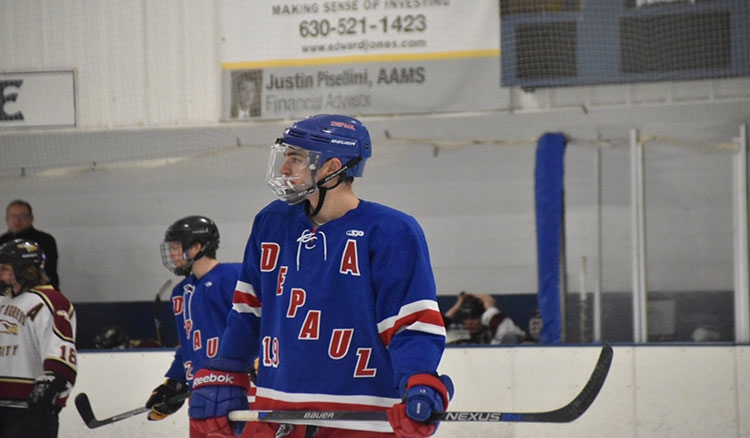 There are currently 35 active club sports at DePaul, ranging from individual sports like rock climbing and cycling to sports with rosters such as rugby and lacrosse. (DePaul University/Lori Kopf)
There are currently 35 active club sports at DePaul, ranging from individual sports like rock climbing and cycling to sports with rosters such as rugby and lacrosse. (DePaul University/Lori Kopf)
There are many reasons students join club sport organizations.
Maybe they want to rejoin a sport they grew up playing but were not recruited for in college, such as basketball and tennis. Perhaps they want to try a sport they were interested in but didn't get the opportunity to play because of conflicting schedules, or it was hard to come by in their area, such as fencing. Sometimes schools don't have a varsity team for every sport and students decide to start their own club, such as ice hockey at DePaul.
Whatever the reason behind joining a club sports league, students enjoy the opportunity to build on their skills, create new friendships and stay physically active.
"DePaul club sports are usually founded when a student is passionate about the sport," says Megan Krone, assistant director of club sports, special events and team challenge. "They then recruit their peers to participate."
There are currently 35 active club sports at DePaul, ranging from individual sports like rock climbing and cycling to sports with rosters like rugby and lacrosse. Some of the clubs have also been successful in competing and have won trophies, such as the roller hockey club winning the 2016-17 regional championship, and the golf club winning the spring 2016 and 2017 NCCGA Regionals. Nine clubs traveled to club national championships in their sport this past year: cycling, dodgeball, golf, roller hockey, men's rowing, women's rowing, tennis, men's volleyball and women's volleyball. The oldest active club sport organization is men's club volleyball established in fall of 1987.
Krone explains clubs are important not only for keeping DePaul students physically active, but also for teaching them important skills that will help them later in life. In organizations that play and perform locally, participants learn how to coordinate events, find venues, and even hire photographers.
For the clubs that travel to compete, students learn how to budget money and time, how to book travel arrangements and hotels, and how to hire coaches that can help the club succeed against other opponents. These students learn about the management aspects of organizations while participating in the activities they love.
"I got involved because I love hockey and tennis, and club sports are an easy way to keep playing," says Bradley Spangenberg, a senior at DePaul, majoring in management. "Others get involved because it is a good way to meet people and build friendships in college. Club sports also keep you active and can give you a small break from the typical stress of school."
Because the organizations are not associated with DePaul's athletic program, participants must raise money to stay active, which is usually done in three different ways. Clubs can apply to the SAF-B, a funding source for student organizations at DePaul that include restrictions and guidelines about how clubs can receive funding and how much they are eligible to receive. Another tactic is external fundraising, such as hosting pizza parties or bake sales, which is how most of the money is raised for the organizations. Some clubs require students to pay dues.
The clubs that travel for competitions make the time and raise the money in order to attend games and tournaments. This year, for example, DePaul's ice hockey club plans to travel to Kentucky, Wisconsin, Missouri, Ohio and Minnesota for games during the 2017-18 season. The games are played on Fridays and Saturdays so that they do not interfere with classes. The player fees to participate in the club are $2,800. These students also purchase the equipment they use for hockey.
Krone hopes to create a program-level initiative that will allow university club sports to work together to help increase their visibility at DePaul.
"We are pushing to get more people to know about these clubs and to get involved," says Krone. "Sports are a great way to bring people together and build affinity. Hopefully with practice spaces and home game arenas moving closer, like the ice hockey club moving into the city, more people will be able to watch and support the clubs."